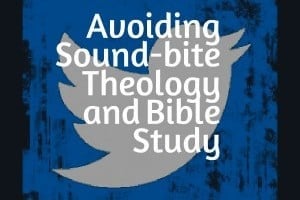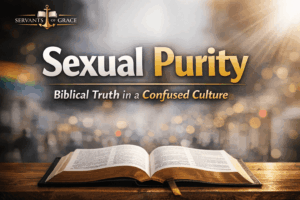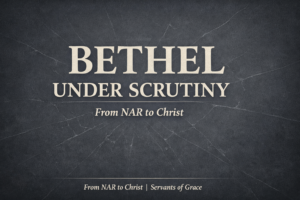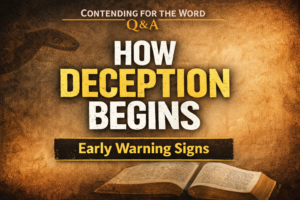⏱️ Estimated Reading Time: 6 min read
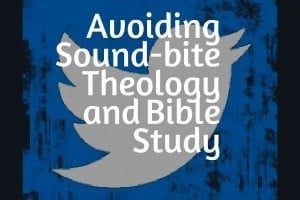 There is a recurring theme I notice when engaging in conversations with people on social media. This theme presents itself when a passage of Scripture is being discussed, more often than not, a verse or set of verses that is typically well known. Perhaps the issue resides in our familiarity with such passages. Have we read them so many times that our minds tend to gloss over the details and the underlying message being presented, let alone any connections to other similar passages with related themes found elsewhere in Scripture?
There is a recurring theme I notice when engaging in conversations with people on social media. This theme presents itself when a passage of Scripture is being discussed, more often than not, a verse or set of verses that is typically well known. Perhaps the issue resides in our familiarity with such passages. Have we read them so many times that our minds tend to gloss over the details and the underlying message being presented, let alone any connections to other similar passages with related themes found elsewhere in Scripture?
I often wonder if this is a result of our sound-bite approach to approaching God’s Word. We tend to think of passages of Scripture in short tweet like concepts, hoping to some degree to have a clever quip to provide someone on social media to win an argument or to demonstrate that we can pull a verse (or at least a portion of one often out of context) from the back of our minds to demonstrate our knowledge of Scripture.
The question we must ask ourselves is this a demonstration of a real commitment to studying the Bible? Are sound-bites the answer or is spending time digging deep into the pages of Scripture, analyzing the details while paying attention to how those details form the mosaic of the larger presentation what God expects from us? I submit it is the latter and here is why I make such a suggestion.
Recently I have been spending a great deal of time digging into the first four chapters of Genesis. Now these are chapters most believers would readily admit they are quite familiar with, especially since most valiantly begin their pursuit of reading through the Bible in a year with these chapters. Most have likely lost count of the number of times they have read the creation story, the account of the fall, or the murder of Abel at the hands of his brother Cain. These events (i.e. creation, fall, etc.) are familiar to us and we can recite from memory the “big ideas” if you will regarding what those events are all about. However, there are a plethora of important details that are often overlooked and questions that often go unasked and unanswered again likely due to our familiarity with these chapters. Questions such as “Why was Eve not surprised when a “Serpent” engaged her in conversation?” or “Why was it important that Adam and Eve saw they were naked and made fig leaf garments to cover themselves?” or “If God said when they ate of the fruit they would die, why did Adam and Eve not immediately die?” or “Why did God rest on the seventh day and make that day holy?”. There are just a few questions I have been asking of late and exploring. I will readily admit the study of these questions has resulted in some informative and important connections being made to key issues that flow throughout Scripture.
If taking the time to ask some simple yet probing questions about the text in the first four chapters of Genesis can lead to such depth in Bible study, just imagine what taking the time to engage the rest of Scripture on that level will lead you. Such an approach of course requires far more than sound-bite theology and Bible study, it requires time, patience, the honesty to rethink at times our positions, and a desire to follow the trail of truth wherever the Holy Spirit takes us through the course of our studies.
Here is an example of how this might work. The topic of the New Covenant often comes up in the course of discussion on many Facebook forums I belong to. The statement many make is that Old Covenant being labeled as old must no longer be of value because after all we have a new covenant. A response I typically provide to such a statement involves a series of probing questions designed to focus the conversation on an investigation of the text or texts in question. I often ask “What is new about this covenant?”, “Who does Jeremiah 31 and Hebrews 10 state this new covenant is made with and why is that important?”, “Where is this new covenant being written and by whom”?, and “What are the terms of this covenant and why is it significant to understand it in terms of a marriage covenant?” Given these questions interact with key statements in Jeremiah 31:31-33 and Hebrews 10:15-16, the purpose of asking these questions is rooted in focusing the discussion back on the biblical text instead of what we often think the text is saying.
After these questions are addressed and some discussion takes place, the next step in the process is to start looking at what key words such as “new” and “covenant” mean. All this requires is taking a look at a quality Bible dictionary or perhaps an online tool such as www.blueletterbible.org where words meanings and other instances where that same word has been used elsewhere in Scripture can be analyzed. This also provides the opportunity for patterns and principles to be recognized and for the overall flow of thought in Scripture to impact our understanding. This may also require reanalyzing the answers to the questions that were initially asked. Do our answers still remain valid based on the further study of the passage in question and related passages.
This necessarily leads to a focus on application. Once again using the new covenant concept as an example, how does the understanding that has been gained impact how I love God and others? If this covenant is a marriage covenant, how am I being faithful to the terms of that covenant or am I? If the answer is I am not being faithful, what changes need to be made and what does Scripture have to say about that? This of course may certainly lead to another set of passages, another series of probing questions, another analysis of word meanings, and another set of questions regarding application.
This is the nonstop flow of what it means to study, understand, and apply the truth of Scripture to our lives. Does this take time and effort? Absolutely but this is after all what God commands of His people and if we truly love God, spending time in His Word should be a joy and not viewed as a chore. Digging into Scripture versus sound-bite/one-liner Twitter type study should be a no brainer. Spend time in God’s Word. There is a lifetime of treasures to be discovered.
